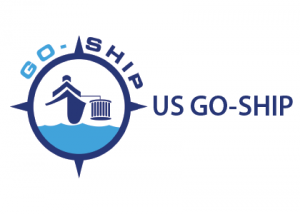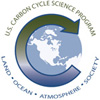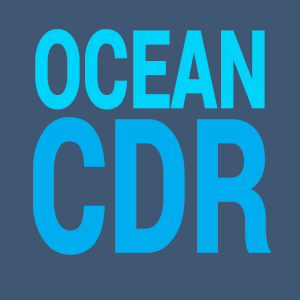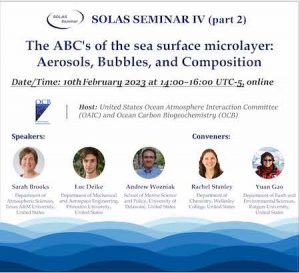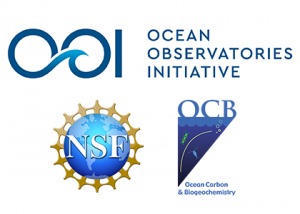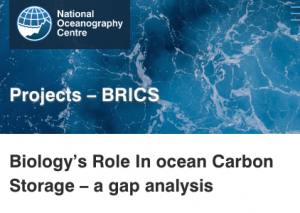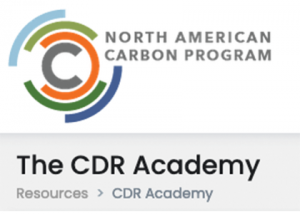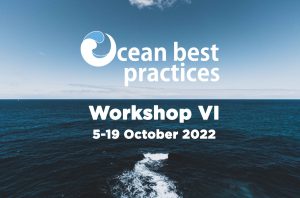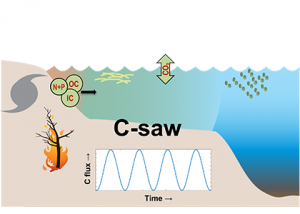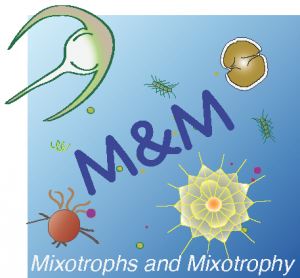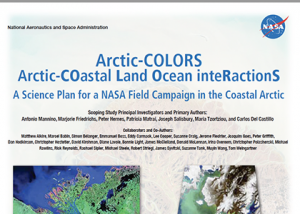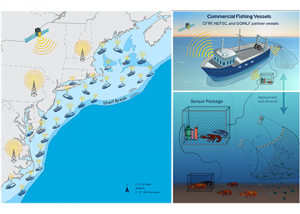US GO-SHIP is seeking scientists with experience in physical or chemical oceanography (hydrography) who would be interested in participating as co-Chief Scientist on the decadal re-occupation of the U.S. GO-SHIP (https://usgoship.ucsd.edu and http://www.go-ship.org) hydrographic long-line known as I05 (32°S in the Indian Ocean). This expedition is ~2 months long (Fremantle, Australia to Cape Town, South […]
Read MoreThe US Carbon Cycle Science Program is seeking nominations, including self-nominations, for potential leads and authors to draft the Third Decadal US Carbon Cycle Science Plan. Please submit your suggestions via this form. Once leads are finalized, a workshop will be organized to kick off the writing stage of the plan. Kathy Tedesco kathy.tedesco@noaa.gov See […]
Read MoreJanuary 24 Webinar – Outcomes from the OCB mCDR MRV workshop: What we learned and what’s coming next
In September 2022, the OCB community gathered for a workshop to build the OCB community’s capacity to conduct research on Measurement, Reporting and Verification (MRV) of marine CDR by identifying priorities, pathways and best practices in this relatively new area. The workshop was designed to provide both education for the community as well as ample […]
Read MoreOCB hosting SOLAS Seminar IV (part 2) – The ABCs of the sea surface microlayer: Aerosols, Bubbles, and Composition – February 10 The sea surface microlayer is an important interface controlling the transfer of energy, material and gases between the oceans and the atmosphere, and has been a primary focus of the SOLAS programme since […]
Read MoreThe Ocean Observatories Initiative (OOI) Biogeochemical (BGC) Sensor Data Best Practices and User Guide is the result of an NSF-funded (OCE2033919) grass-roots community effort to broaden the use of OOI biogeochemical sensor data and increase community capacity to produce analysis-ready data products. The guide includes five chapters: The Introduction (Chapter 1) provides information on the […]
Read MoreUpcoming Funding Opportunity Announcement: SEA CO2: Sensing Exports of Anthropogenic Carbon through Ocean Observation U.S. Department of Energy Advanced Research Projects Agency – Energy (ARPA-E)
Read MoreThe NOAA Ocean Acidification Program on behalf of the National Oceanographic Partnership Program (NOPP) is soliciting proposals focused on (a) reducing uncertainty about the extent and durability of marine Carbon Dioxide Removal (mCDR); (b) understanding associated co-benefits (including ocean acidification mitigation) and risks of mCDR; and (c) the science needed to build regulatory frameworks for […]
Read MoreYou are invited to take part in a community-wide survey to identify knowledge gaps in understanding biology’s role in ocean carbon storage. The survey forms part of the BRICS project which aims to identify the gaps in our understanding, and highlight model limitations, which result in uncertainty in contemporary and future ocean carbon storage.The survey […]
Read MoreCarbon Dioxide Removal (CDR) is a hot topic right now – there have been a flurry of various activities recently1. As a community of practice focusing on carbon cycle science in North America and adjacent oceans, NACP is poised to make significant contributions in this arena as new programs are initiated and existing CDR activities […]
Read MoreThe Office of Science and Technology Policy (OSTP) and the Council on Environmental Quality (CEQ), on behalf of the interagency Ocean Policy Committee (OPC), request input from all interested parties to inform the development of a U.S. Ocean Climate Action Plan (OCAP) that will help guide and coordinate actions by the Federal government and civil […]
Read MoreTiming: Tuesday, October 11 9:00-11:00 am EDT Please register for the Ocean Best Practices Workshop (free) in order to participate in this special session. You can sign up for this session via the Workshop Team Calendar (click on our Oct. 11 session and you’ll see a button to sign up to participate). One of the […]
Read MoreC-Saw: Time domain controls on carbon storage, release, and transformation in coastal and estuarine waters following extreme events The aim of this workshop is to push forward our knowledge of extreme weather and fire effects on coastal carbon cycling. The workshop will bring together a diverse group of scientists to build a community of monitors/observers, […]
Read MoreRegister to attend the next OCB Mixotrophs & Mixotrophy Working Group Meeting on Mixotroph Evolution
The theme of this meeting will be mixotroph evolution, spanning from the evolutionary origins of mixotrophy to the evolutionary fate of mixotrophs in a changing ocean. The two speakers will be: Elisabeth Hehenberger (Biology Center CAS, Czech Republic) Holly Moeller (University of California, Santa Barbara, USA) Monday, Nov 14 2022 11:00 AM – 12:30 PM […]
Read MoreNASA is soliciting applications for members of the Arctic-COastal Land Ocean inteRactionS (Arctic-COLORS) field campaign Science Definition Team (SDT). Arctic-COLORS is a proposed NASA-funded field campaign designed primarily to quantify the biogeochemical response of the Arctic coastal environment to global change and anthropogenic disturbances. Interested applicants should respond to this call by sending a Letter […]
Read MoreOCB Scoping Workshop: Jan 18-20, 2023 (Woods Hole, MA) This 3-day scoping workshop will initiate a dialog among key stakeholders and collaborators across the commercial fishing community, federal and state governments, technology companies, and academia to focus on building a cost-effective, coastal biogeochemical (BGC) observing network. Existing data coverage often lacks the spatial and temporal […]
Read More

